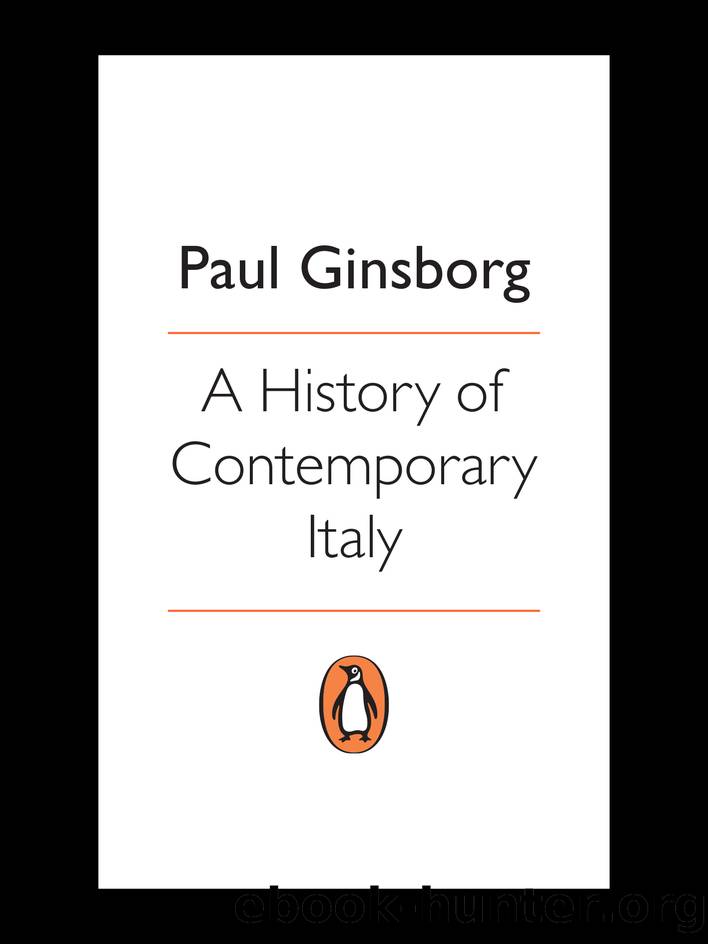A History of Contemporary Italy by Paul Ginsborg

Author:Paul Ginsborg
Language: eng
Format: epub
ISBN: 9780141931678
Publisher: Penguin Books Ltd
Published: 2009-02-06T16:00:00+00:00
The State in the 1960s
Far from the 1960s going down as the decade of reform, they saw instead the marked decline of key areas of the state apparatus. The centre-left governments had announced, more than once, their intention of reforming the state along rational, efficient and democratic lines. The state's actual development was in a quite different direction.
a. THE DECLINE OF PUBLIC ENTERPRISE
In the 1950s public enterprise in Italy had, by and large, been a success story. IRI had won the attention and admiration of many economic observers outside Italy. Sinigaglia's plan for steel had been a resounding success and an important element in the Italian ‘miracle’. ENI had hardly been run in an exemplary fashion, but no one could deny the entrepreneurial genius of Mattei, or ENI's dynamism while under his control.
This picture changes significantly in the course of the next decade. The major programmes of the 1950s – the development of steel, the building of autostrade and the expansion of the telephone network – were coming to an end, without any strategic indication of where state enterprise was going next. At the same time, it became increasingly free of controls. Public enterprise was significantly less self-financing than the major private firms and was heavily dependent on public money, which it obtained all too easily; its various activities were not subject to the scrutiny of any independent body of senior civil servants; its nominal head, the Minister of Public Holdings, was no more than the lapdog of one or other of the DC factions (first the Base and then the Fanfaniani). In the period 1963–72, state industry achieved minimal levels of profitability. IRI's last good year was 1963, after which it showed losses for five of the following nine years. ENI achieved modest results until 1969, after which it too dipped into the red. Other state enterprises showed heavy losses for the whole decade.64
Such developments were not uncommon elsewhere in Europe, but in Italy they assumed a pathology all of their own. Political power and industrial management became ever more closely intertwined, with disastrous results. More and more jobs in the state enterprises were assigned not on the grounds of merit or competence but on those of party or factional loyalty. Lottizzazione, the practice of dividing among the governing parties the command posts of the public sector, became the order of the day.65
Guido Carli, the Governor of the Bank of Italy from 1960 to 1975, declared that this period witnessed the growth of what he termed a ‘state bourgeoisie’. This term has been used rather widely and loosely, and excessive claims have been made for the ‘state bourgeoisie's’ homogeneity and for its political as well as economic dominance. None the less, there was no denying the growth in the number and influence of employees in the state sector, most of them appointed, even in the lower echelons, on the principle of lottizzazione. At the top, a new generation of public managers and entrepreneurs, very closely linked with the dominant
Download
This site does not store any files on its server. We only index and link to content provided by other sites. Please contact the content providers to delete copyright contents if any and email us, we'll remove relevant links or contents immediately.
| Africa | Americas |
| Arctic & Antarctica | Asia |
| Australia & Oceania | Europe |
| Middle East | Russia |
| United States | World |
| Ancient Civilizations | Military |
| Historical Study & Educational Resources |
Room 212 by Kate Stewart(5104)
The Crown by Robert Lacey(4805)
Endurance: Shackleton's Incredible Voyage by Alfred Lansing(4767)
The Iron Duke by The Iron Duke(4349)
The Rape of Nanking by Iris Chang(4201)
Joan of Arc by Mary Gordon(4099)
Killing England by Bill O'Reilly(3995)
Say Nothing by Patrick Radden Keefe(3975)
I'll Give You the Sun by Jandy Nelson(3428)
Shadow of Night by Deborah Harkness(3356)
Hitler's Monsters by Eric Kurlander(3328)
Mary, Queen of Scots, and the Murder of Lord Darnley by Alison Weir(3200)
Blood and Sand by Alex Von Tunzelmann(3193)
Eleanor & Park by Rainbow Rowell(3149)
Darkest Hour by Anthony McCarten(3118)
Margaret Thatcher: The Autobiography by Thatcher Margaret(3076)
Book of Life by Deborah Harkness(2930)
Red Famine: Stalin's War on Ukraine by Anne Applebaum(2927)
The One Memory of Flora Banks by Emily Barr(2856)
